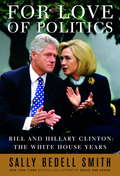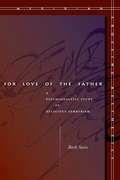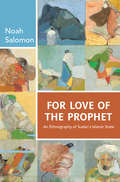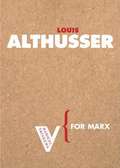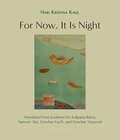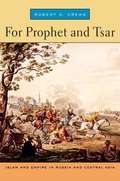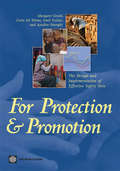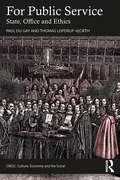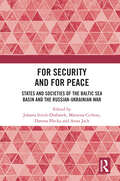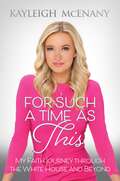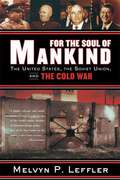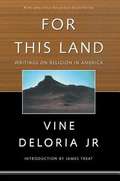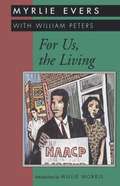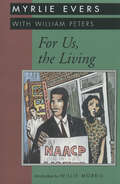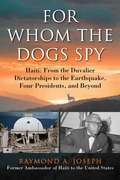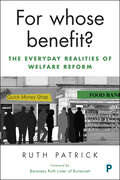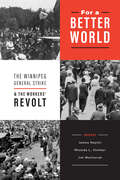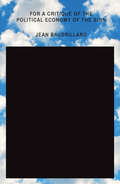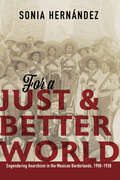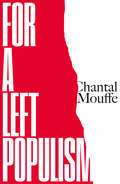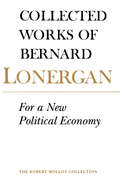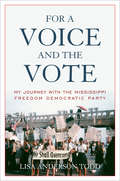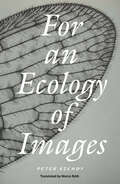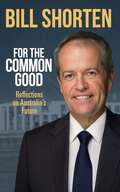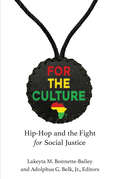- Table View
- List View
For Love of Politics: Inside the Clinton White House
by Sally Bedell SmithDuring their eight years in the White House, Bill and Hillary Clinton worked together more closely than the public ever knew. Their intertwined personal and professional lives had far-reaching consequences--for politics, domestic policy, and international affairs--and their marital troubles became a national soap opera.
For Love of the Father
by Ruth SteinStein (Psychotherapy and Psychoanalysis, New York University) employs psychoanalytic theory to explain suicidal terrorism, arguing that Islamic extremists perform destructive and self-destructive actions in order to merge with God. Rather than being motivated by hatred or political gain, the author suggests that extremists are driven by love of God, killing His enemies to express their total submission to the deity. Stein goes on to show that this pattern of submission and sacrifice is not unique to Islam (or to Islamic extremists), but is present in other forms of patriarchal monotheism. This important book should will appeal to any reader who wants to understand the motivations of the 9/11 attackers (as well those of any other religious terrorists). Annotation ©2010 Book News, Inc. , Portland, OR (booknews. com)
For Love of the Prophet: An Ethnography of Sudan's Islamic State
by Noah SalomonFor some, the idea of an Islamic state serves to fulfill aspirations for cultural sovereignty and new forms of ethical political practice. For others, it violates the proper domains of both religion and politics. Yet, while there has been much discussion of the idea and ideals of the Islamic state, its possibilities and impossibilities, surprisingly little has been written about how this political formation is lived. For Love of the Prophet looks at the Republic of Sudan's twenty-five-year experiment with Islamic statehood. Focusing not on state institutions, but rather on the daily life that goes on in their shadows, Noah Salomon's careful ethnography examines the lasting effects of state Islamization on Sudanese society through a study of the individuals and organizations working in its midst. Salomon investigates Sudan at a crucial moment in its history--balanced between unity and partition, secular and religious politics, peace and war--when those who desired an Islamic state were rethinking the political form under which they had lived for nearly a generation. Countering the dominant discourse, Salomon depicts contemporary Islamic politics not as a response to secularism and Westernization but as a node in a much longer conversation within Islamic thought, augmented and reappropriated as state projects of Islamic reform became objects of debate and controversy. Among the first books to delve into the making of the modern Islamic state, For Love of the Prophet reveals both novel political ideals and new articulations of Islam as it is rethought through the lens of the nation.
For Marx (Radical Thinkers)
by Louis Althusser Ben BrewsterThis is the work in which Louis Althusser formulated some of his most influential ideas For Marx, first published in France in 1968, has come to be regarded as the founding text of the school of "structuralist Marxism" which was presided over by the fascinating and enigmatic figure of Louis Althusser. Structuralism constituted an intellectual revolution in the 1960s and 1970s and radically transformed the way philosophy, political and social theory, history, science, and aesthetics were discussed and thought about. For Marx was a key contribution to that process and it fundamentally recast the way in which many people understood Marx and Marxism. This book contains the classic statements of Althusser's analysis of the young Marx and the importance of Feuerbach during this formative period, of his thesis of the "epistomological break" between the early and the late Marx, and of his conception of dialectics, contradiction and "overdetermination. " Also included is a study of the materialist theater of Bertolazzi and Brecht and the critique of humanist readings of Marxism. Since his death in 1990, Althusser's legacy has come under renewed examination and it is increasingly recognized that the influence of his ideas has been wider and deeper than previously thought: reading For Marx, in its audacity, originality and rigor, will explain why this impact was so significant.
For Now, It Is Night: Stories
by HARI KRISHNA KAUL&“An enthralling — and welcome — reclamation of Kaul&’s fiction. . . Kaul&’s work shimmers with questions of reality and illusion, home and exile.&” – The New York Times Book Review 17 lively short stories provide an irreverent examination of exile, drawn from the ever-observant pen of one of Kashmir's most celebrated writersHari Krishna Kaul, one of the most celebrated Kashmiri writers, published most of his work between 1972 and 2000. His short stories, shaped by the social crisis and political instability in Kashmir, explore – with a keen eye for detail, biting wit, and deep empathy – themes of isolation, individual and collective alienation, corruption, and the social mores of a community that experienced a loss of homeland, culture, and language.In these pages, we will find friends stuck forever in the same class at school while the world changes around them; travelers forced to seek shelter in a battered, windy hostel after a landslide; parents struggling to deal with displacement as they move away from Kashmir with their children, or loneliness as their children leave in search of better prospects; the cabin fever of living through a curfew . . .Brilliantly translated in a unique collaborative project, For Now, It Is Night brings a comprehensive selection of Kaul&’s stories to English readers for the first time.
For Prophet And Tsar: Islam And Empire In Russia And Central Asia
by Robert D. CrewsDrawing on police and court records, and Muslim petitions, denunciations and clerical writings - not accessible prior to 1991 - this text unearths the fascinating relationship between an empire and its subjects.
For Protection and Promotion: The Design And Implementation of Effective Safety Nets
by Margaret Grosh Azedine Ouerghi Emil Tesliuc Carlo Del NinnoSafety nets are noncontributory transfer programs targeted to the poor or vulnerable. They play important roles in social policy. Safety nets redistribute income, thereby immediately reducing poverty and inequality; they enable households to invest in the human capital of their children and in the livelihoods of their earners; they help households manage risk, both ex ante and ex post; and they allow governments to implement macroeconomic or sectoral reforms that support efficiency and growth. To be effective, safety nets must not only be well intended, but also well designed and well implemented. A good safety net system and its programs are tailored to country circumstances, adequate in their coverage and generosity, equitable, cost-effective, incentive compatible, and sustainable. Good safety nets are also dynamic and change over time as the economy changes or as management problems are solved and new standards are set. Drawing on a wealth of research, policy, and operational documents from both academia and the World Bank's work in over 100 countries, 'For Protection and Promotion' provides pragmatic and informed guidance on how to design and implement safety nets, including useful information on how to define eligibility and select beneficiaries, set and pay benefits, and monitor and evaluate programs and systems. The book synthesizes the literature to date and enriches it with new examples on various program options-cash transfers (conditional and unconditional), in-kind transfers, price subsidies, fee waivers, and public works. It concludes with a comprehensive diagnostic for fitting safety net systems and programs to specific circumstances.
For Public Service: State, Office and Ethics (CRESC)
by Paul Du Gay Thomas Lopdrup-HjorthThis book develops a particular stance on the subject of public service. It does so in large part by indicating how early modern political concepts and theories of state, sovereignty, government, office and reason of state can shed light on current problems, failings and ethical dilemmas in politics, government and political administration. Simply put, public service is an activity involving the constitution, maintenance, projection and regulation of governmental authority. Public service therefore has a distinctive character because of the singularity of its ‘official’ object or ‘core task’ – namely, the activity of governing in an official capacity through and on behalf of a state. In pursuing this activity, public servants – civil, juridical and military – have a range of tasks to perform. It is only once the nature of those tasks is appreciated that we are able to identify the unique character of public service. The authors employ early modern political concepts and doctrines of state, sovereignty, government, office and reason of state in order to critically analyse contemporary political issues and offer solutions to problems concerning the status and conduct of public service. This book aims to remind public servants of the status of their ‘calling’ as office-holders in the service of the state, a daunting task given the rising tide of populism and the widespread prevalence of anti-statist, bureaucrat-bashing political discourse. It stresses the governmental dimension of the work of public servants as occupants of official roles in the service of the state, in order to reinforce their legitimate position in articulating public interests against the excesses of private interests and intense partisanship that continue to dominate many societies. This timely and thought-provoking book will be of great interest to those working within a range of fields in the humanities and social sciences, including political science, history, sociology, philosophy, organization studies and public administration.
For Security and For Peace: States and Societies of the Baltic Sea Basin and the Russian-Ukrainian War
by Jolanta Itrich-Drabarek Marzena Cichosz Danuta Plecka Anna JachThis book formulates a conceptual framework to analyse the Russian-Ukrainian conflict. It examines the strategies of the Baltic states and the attitudes of the societies of the Baltic Sea basin, directed not only towards limiting the consequences of the Russian-Ukrainian war but also towards restoring peace and ensuring future security in the region. It assesses the Baltic states during and after the conflict, discussing the problem of managing a coherent policy towards Russia and Ukraine, the challenges faced by states during and after the conflict, analysing the attitudes of societies and their evolution during and after the conflict. The volume will be of interest to scholars and researchers of European studies and war, international relations, political science, peace and conflict studies.
For Such a Time as This: My Faith Journey through the White House and Beyond
by Kayleigh McEnanyKayleigh McEnany describes her path to the White House podium, bringing the reader behind the scenes in the world’s most powerful building and illuminating how faith got her through. <P><P>If you would have told me that in the year 2020 I would stand at the White House podium and communicate with the American people as COVID-19 ravaged the globe and violent protests beset the nation, I would have told you that you were crazy. But Jesus Christ had this very plan for my life. <P><P>From White House intern to White House press secretary, from production assistant to national television host, from Catholic all-girls high school to Harvard Law School, God has guided my path through uncharted territory. <P><P>In For Such a Time as This, I will chronicle my journey to the White House and offer never-before-told anecdotes about what really happened within the Trump administration. You will experience some of the most high stakes moments in the West Wing right alongside me as I reveal how faith got me through. <P><P><b>A New York Times Best Seller</b>
For The Soul Of Mankind: The United States, The Soviet Union, And The Cold War
by Melvyn P. LefflerTo the amazement of the public, pundits, and even the policymakers themselves, the ideological and political conflict that had endangered the world for half a century came to an end in 1990. How did that happen? What caused the cold war in the first place, and why did it last as long as it did? The distinguished historian Melvyn P. Leffler homes in on four crucial episodes when American and Soviet leaders considered modulating, avoiding, or ending hostilities and asks why they failed: Stalin and Truman devising new policies after 1945; Malenkov and Eisenhower exploring the chance for peace after Stalin's death in 1953; Kennedy, Khrushchev, and LBJ trying to reduce tensions after the Cuban Missile Crisis of 1962; and Brezhnev and Carter aiming to sustain détente after the Helsinki Conference of 1975. All these leaders glimpsed possibilities for peace, yet they allowed ideologies, political pressures, the expectations of allies and clients, the dynamics of the international system, and their own fearful memories to trap them in a cycle of hostility that seemed to have no end. For the Soul of Mankind illuminates how Reagan, Bush, and, above all, Gorbachev finally extricated themselves from the policies and mind-sets that had imprisoned their predecessors, and were able to reconfigure Soviet-American relations after decades of confrontation.
For This Land: Writings on Religion in America
by Vine Deloria Jr.The essays in this collection express Deloria's concern for the religious dimensions and implications of human existence. For This Land offers a distinctive approach to comprehending human existence from one of the leading critics of mainstream American thought.
For Us, The Living
by William Peters Myrlie B. EversIn 1967, when this brave book was first published, Myrlie Evers said, "Somewhere in Mississippi lives the man who murdered my husband. " Medgar Evers died in a horrifying act of political violence. Among both blacks and whites the killing of this Mississippi civil rights leader intensified the menacing moods of unrest and discontent generated during the civil rights era. His death seemed to usher in a succession of political shootings--Evers, then John Kennedy, then Martin Luther King, Jr. , then Robert Kennedy. At thirty-seven while field secretary for the NAACP, Evers was gunned down in Jackson, Mississippi, during the summer of 1963. Byron De La Beckwith, an arch segregationist charged with the crime, was released after two trials with hung juries. In 1994, after new evidence surfaced thirty years later, Beckwith was arrested and tried a third time. Medgar Evers's widow saw him convicted and jailed with a life sentence. In For Us, the Living this extraordinary woman tells a moving story of her courtship and of her marriage to this heroic man who learned to live with the probability of violent death. She describes her husband's unrelenting devotion to the quest of achieving civil rights for thousands of black Mississippians and of his ultimate sacrifice on that hot summer night. With this reprinting of her poignant yet painful memoir, a book long out of print comes back to life and underscores the sacrifice of Medgar Evers and his family. Introduced in a reflective essay written by the acclaimed Mississippi author Willie Morris, this account of Evers's professional and family life will cause readers to ponder how his tragic martyrdom quickened the pace of justice for black people while withholding justice from him for thirty years. Since the conviction of Beckwith in a dramatic and historical trial in a Mississippi court there has been renewed acclaim for Evers. One speculates that, had he lived, he might have attained even more for the equality of African Americans in national life.
For Us, the Living (Banner Books)
by Myrlie Evers WilliamsIn 1967, when this brave book was first published, Myrlie Evers said, “Somewhere in Mississippi lives the man who murdered my husband.” Medgar Evers died in a horrifying act of political violence. Among both blacks and whites, the killing of this Mississippi civil rights leader intensified the menacing moods of unrest and discontent generated during the civil rights era. His death seemed to usher in a succession of political shootings—Evers, then John Kennedy, then Martin Luther King, Jr., then Robert Kennedy. At thirty-seven while field secretary for the NAACP, Evers was gunned down in Jackson, Mississippi, during the summer of 1963. Byron De La Beckwith, an arch segregationist charged with the crime, was released after two trials with hung juries. In 1994, after new evidence surfaced thirty years later, Beckwith was arrested and tried a third time. Medgar Evers's widow saw him convicted and jailed with a life sentence. In For Us, the Living this extraordinary woman tells a moving story of her courtship and of her marriage to this heroic man who learned to live with the probability of violent death. She describes her husband's unrelenting devotion to the quest of achieving civil rights for thousands of black Mississippians and of his ultimate sacrifice on that hot summer night. With this reprinting of her poignant yet painful memoir, a book long out of print comes back to life and underscores the sacrifice of Medgar Evers and his family. Introduced in a reflective essay written by the acclaimed Mississippi author Willie Morris, this account of Evers's professional and family life will cause readers to ponder how his tragic martyrdom quickened the pace of justice for black people while withholding justice from him for thirty years. Since the conviction of Beckwith in a dramatic and historical trial in a Mississippi court there has been renewed acclaim for Evers. One speculates that, had he lived, he might have attained even more for the equality of African Americans in national life.
For Whom the Dogs Spy: Haiti: From the Duvalier Dictatorships to the Earthquake, Four Presidents, and Beyond
by Raymond A. JosephWhen the 2010 earthquake struck Haiti, Raymond Joseph, the former Haitian ambassador to the United States, found himself rushing back to his beloved country. The earthquake ignited a passion in Joseph, inspiring him to run for president against great competition, including two well-known Haitian pop stars, his nephew Wyclef Jean and Michel Martelly. But he couldn't compete in a democratic system corrupt to the core.Joseph's insider's account-having served four presidents-explores the country's unfolding democracy. He unearths the hidden stories of Haiti's cruel dictators, focusing on the tyranny of François "Papa Doc" Duvalier, who used the legend of voodoo to bewitch the country into fearing him.Joseph's terrifying experiences while infiltrating the father-son regime are chilling. Threatened by Duvalier's budding gestapo-like police, Joseph sought sanctuary in America. His grueling experience in Haitian politics gave him a unique outlook on international affairs, and he excelled in his ambassadorial career in the United States.Deep personal knowledge of politics allows Joseph to speak candidly about Haitian history. Readers will be surprised at how important the country of Haiti has been in global (and especially American) history. In this decades-spanning work, he challenges common misconceptions about Haiti. The country is rarely referenced without a mention of it being the "poorest in the Western Hemisphere," a reductive label unfit for summarizing its rich history. There is no discussion around Haitian history beyond the war of independence. In For Whom the Dogs Spy, Raymond Joseph provides a compelling, modern-day look at Haiti like no other.With this book, Ambassador Raymond Joseph warns readers about Haiti's current political leaders' attempts to impose a new dictatorship. His hope is that Haiti can right itself despite the destruction it has suffered at the hands of man and nature.
For Whose Benefit?: The Everyday Realities of Welfare Reform
by Ruth PatrickWhat does day-to-day life involve for those who receive out-of-work benefits? Is the political focus on moving people from ‘welfare’ and into work the right one? And do mainstream political and media accounts of the ‘problem’ of ‘welfare’ accurately reflect lived realities? For whose benefit? The everyday realities of welfare reform explores these questions by talking to those directly affected by recent reforms. Ruth Patrick interviewed single parents, disabled people and young jobseekers on benefits repeatedly over five years to find out how they experienced the rights and responsibilities of citizenship, and whether the welfare state still offers meaningful protection and security in times of need. She reflects on the mismatch between the portrayal of ‘welfare’ and everyday experiences, and the consequences of this for the UK’s ongoing welfare reform programme. Exploring issues including the meaning of dependency, the impact of benefit sanctions and the reach of benefits stigma, this important book makes a timely contribution to ongoing debates about the efficacy and ethics of welfare reform.
For a Better World: The Winnipeg General Strike and the Workers' Revolt
by James Naylor;Rhonda L. Hinther;Jim Mochoruk;editorsCanada’s largest and most famous example of class conflict, the Winnipeg General Strike, redefined local, national, and international conversations around class, politics, region, ethnicity, and gender. The Strike’s centenary occasioned a re-examination of this critical moment in working-class history, when 300 social justice activists, organizers, scholars, trade unionists, artists, and labour rights advocates gathered in Winnipeg in 2019. Probing the meaning of the General Strike in new and innovative ways, For a Better World includes a selection of contributions from the conference as well as others’ explorations of the character of class confrontation in the aftermath of the First World War. Editors Naylor, Hinther, and Mochoruk depict key events of 1919, detailing the dynamic and complex historiography of the Strike and the larger Workers’ Revolt that reverberated around the world and shaped the century following the war. The chapters delve into intersections of race, class, and gender. Settler colonialism’s impact on the conflict is also examined. Placing the struggle in Winnipeg within a broader national and international context, several contributors explore parallel strikes in Edmonton, Crowsnest Pass, Montreal, Kansas City, and Seattle. For a Better World interrogates types of commemoration and remembrance, current legacies of the Strike, and its ongoing influence. Together, the essays in this collection demonstrate that the Winnipeg General Strike continues to mobilize—revealing our radical past and helping us to think imaginatively about collective action in the future.
For a Critique of the Political Economy of the Sign
by Jean BaudrillardA material analysis of the sign which deepens Marx's critique of political economy for spectacular times.What if the problems of modern society don't come from production, but rather consumption and the system of cultural signs? In this classic work from the defining intellectual of the postmodern, Jean Baudrillard, For a Critique of the Political Economy of the Sign takes Marx's critique of political economy and its analysis of the commodity form as the starting point for an analysis of signs and their meaning in modern society. Influenced by Lefebvre's critique of everyday life, Barthes's semiology, and Situationism, Baudrillard analyses how objects are encoded within the system of signs and meanings that constitute contemporary media and consumer societies. Combining semiological studies and sociology of the consumer society, For a Critique of the Political Economy of the Sign contains Baudrillard's most extensive engagement with Marxism and shows him at a critical juncture for the development of his thought.
For a Just and Better World: Engendering Anarchism in the Mexican Borderlands, 1900-1938
by Sonia HernandezCaritina Piña Montalvo personified the vital role played by Mexican women in the anarcho-syndicalist movement. Sonia Hernández tells the story of how Piña and other Mexicanas in the Gulf of Mexico region fought for labor rights both locally and abroad in service to the anarchist ideal of a worldwide community of workers. An international labor broker, Piña never left her native Tamaulipas. Yet she excelled in connecting groups in the United States and Mexico. Her story explains the conditions that led to anarcho-syndicalism's rise as a tool to achieve labor and gender equity. It also reveals how women's ideas and expressions of feminist beliefs informed their experiences as leaders in and members of the labor movement. A vivid look at a radical activist and her times, For a Just and Better World illuminates the lives and work of Mexican women battling for labor rights and gender equality in the early twentieth century.
For a Left Populism
by Chantal MouffeWhat is the "populist moment" and what does it mean for the left?Populism, today, is the expression of a crisis of liberal-democratic politics. It is more than an ideology or a political regime. It is a way of doing politics that can take various forms but emerges when one aims at building a new subject of collective action--the people.In this new book the leading political thinker Chantal Mouffe proposes a new way to define left populism. The political is to be constructed by establishing a political frontier that divides society into two camps, mobilising an "underdog" against "those in power". Populism, far from being a perversion of democracy, constitutes the most adequate political force to recover and reconstitute itself. This new politics must recognise its partisan character. This presents itself as more than the image of demagoguery and emotive rabbles seen across our media. Furthermore, it is an urgent struggle, because the future will be formed by the kind of populism that emerges victorious from the conflict against the current threats of post-politics and post-democracy.
For a New Political Economy: Volume 21
by Bernard Lonergan Philip McshaneBernard Lonergan's economic writings span forty years and represent one of the most important intellectual achievements of the twentieth century. Unfortunately they have been inaccessible outside of the Lonergan research community as the majority of them have not been formally published, and exist only as a group of unfinished essays and material for courses on economics taught by Lonergan. The publication of For a New Political Economy, along with its companion volume, Macroeconomic Dynamics: An Essay in Circulation Analysis (Collected Works of Bernard Lonergan, Volume 15), seeks to remedy this by bringing together the various elements of Lonergan's economic thought. Lonergan's concept of economics differs radically from that of contemporary economists and represent a major paradigm shift. He takes a fresh look at fundamental variables and breaks from centralist theory and practice, offering a uniquely democratic perspective on surplus income and non-political control. For a New Political Economy is a collection of drafts, notes, and essays written by Lonergan in the 1940s on various aspects of economics. This volume provides the intellectual underpinnings of ideas more fully explored in Macroeconomic Dynamics.
For a Voice and the Vote: My Journey with the Mississippi Freedom Democratic Party (Civil Rights and the Struggle for Black Equality in the Twentieth Century)
by Lisa Anderson ToddIn this detailed memoir of political action, a civil rights volunteer recounts her experience with the MFDP during 1964’s Freedom Summer.During the summer of 1964, hundreds of American college students descended on Mississippi to help the state's African American citizens register to vote. Student organizers, volunteers, and community members canvassed black neighborhoods to organize the Mississippi Freedom Democratic Party, a group that sought to give a voice to black Mississippians despite the terror and intimidation they faced.In For a Voice and the Vote, author Lisa Anderson Todd gives a fascinating insider's account of her experience volunteering in Greenville, Mississippi, when she participated in organizing the MFDP. The party provided political education, ran candidates for office, and offered participation in local and statewide meetings for blacks who were denied the vote.For Todd, it was an exciting, dangerous, and life-changing experience. Offering the first full account of the group's five days in Atlantic City, the book draws on primary sources, oral histories, and the author's personal interviews of individuals who were supporters of the MFDP in 1964.
For an Ecology of Images
by Peter SzendyA new, ecological approach to images by a renowned philosopherWhen Susan Sontag first proposed the idea of an &“ecology of images,&” she meant it as an exhortation to be vigilant against the vast surplus of pictures threatening our ability to truly see. Today, beyond the deep anxieties over a diminishing attention economy, concern focuses on the environmental cost of storing and circulating the digital images that confront us with unprecedented speed.Against the disposable rapidity demanded by digital media, Peter Szendy emphasizes the labor and time required for images to develop and come into view. This inquisitive essay takes us from mimicry in the animal kingdom to the history of the shadow, Pliny&’s story about the birth of painting to Nabokov&’s butterflies, the first use of slo-mo in film to the first aerial photograph.
For the Common Good: Reflections on Australia's Future
by Bill ShortenIn For the Common Good, Bill Shorten reflects on the values and beliefs that led him to devote himself to the labour movement and stand for the nation's highest office. He looks back on the emphasis on education and social justice in his childhood in suburban Melbourne, and his many years spent empowering tens of thousands of Australians in workplaces across our continent.Shorten examines the rapid pace of change in our modern world and offers a way forward that enables all Australians to adapt, seize new opportunities and preserve the Australian way—a prosperous society unshakeably committed to fairness. He argues that the key to unlocking a new century of national progress is in building a renewed common good between workers, businesses, governments and the community, from our cities to the regions.In this thoughtful narrative, Bill Shorten provides a unique insight into how a Labor government will shape Australia's future for the better, for all Australians.
For the Culture: Hip-Hop and the Fight for Social Justice (Music and Social Justice)
by Lakeyta Bonnette-Bailey Adolphus BelkFor the Culture: Hip-Hop and the Fight for Social Justice documents and analyzes the ways in which Hip-Hop music, artists, scholars, and activists have discussed, promoted, and supported social justice challenges worldwide. Drawing from diverse approaches and methods, the contributors in this volume demonstrate that rap music can positively influence political behavior and fight to change social injustices, and then zoom in on artists whose work has accomplished these ends. The volume explores topics including education and pedagogy; the Black Lives Matter movement; the politics of crime, punishment, and mass incarceration; electoral politics; gender and sexuality; and the global struggle for social justice. Ultimately, the book argues that Hip-Hop is much more than a musical genre or cultural form: Hip-Hop is a resistance mechanism.
